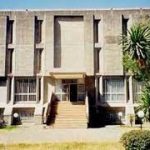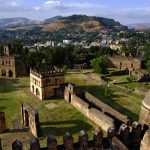Addis Ababa
With a population of more than three million people, Addis Ababa also known as Brussels of Africa is located in the geographic center of the country. It is not only the political capital but also the economic and social nerve center of Ethiopia. Founded by Emperor Menilik in 1887, this big, sprawling hospitable city still city still bears the stamp of the exuberant personality. There are more than 120 international missions and embassies in Addis Ababa, making the city a forefront for international diplomacy in Africa and houses the headquarters of the African Union and the United Nations Economic Commissions for Africa.
Addis Ababa’s cozy espresso bars and patisseries are reminiscent of Rome and the Mediterranean, and its bustling outdoor markets are colorful reminders of more traditional way of life. The people, the bursts of music from café’s or shops, the pungent aromas of spicy cooking, of coffee and frankincense, form a unique Ethiopian pastiche.
Dominated by the 3000 meter (9,840 foot) high Entoto Mountains immediately to the north, Ethiopia’s largest city has grown at an astonishing speed since it was founded just over a century ago. Covering 250 square kilometers (97 square miles), the city rambles pleasantly across many wooded hillsides and gullies cut through with fast-flowing steams. Despite its proximity to the Equator, its lofty altitude- it is the third-highest capital in the world – means that it enjoys a mild, Afro- alpine climate.
From its inception Addis Ababa was clustered around two main centers: the National Palace to the east and the market, with Saint George’s Church, to the west. Together they generated so much activity that the capital grew and developed rapidly.
By the late 1950s Addis Ababa was recognized as the unofficial capital of Africa, and thus was made the headquarters of the United Nations Economic Commission for Africa (ECA) in 1958 and later, in 1963, chosen as headquarters of the African Union (AU). Today Addis Ababa, which bears the imprint of many of these past developments, is a major metropolis, with an estimated population of over three million.
The city stands at the very heart of Ethiopia and enjoys excellent connections with all of the country’s economic zones. Addis Ababa is Africa’s unchallenged capital, with more that seventy embassies and consular representatives clustered in the mountain city.
There is more than enough to do in Addis. There are numerous restaurants offering various exotic dishes from many parts of the world. On the entertainment side you find cinemas showing international films and also stage dramas in Amharic. Sprawled through the city are nightclubs, gymnasiums, Art Galleries, Coffee shops and Spas. The main market-place, known as the Merkato, is the largest open market-place in Africa and has a wonderful range of goods, items of local art and Ethiopian curious and antiques.
Individual and team sports are both extremely popular in Ethiopia. The country’s most popular sport is football and the local football league has a 50 year history. But the country’s most successful sport is athletics where Ethiopia have won 10 gold medals in the Olympic Games. Athletics has been attracting talented runners for generations, but is now popular among the general public which takes part in various mass participation running events held around the country.
Source: Ministry of Culture and Tourism




Leave a Reply